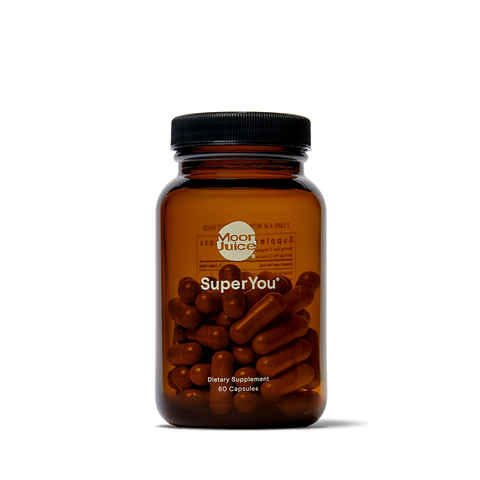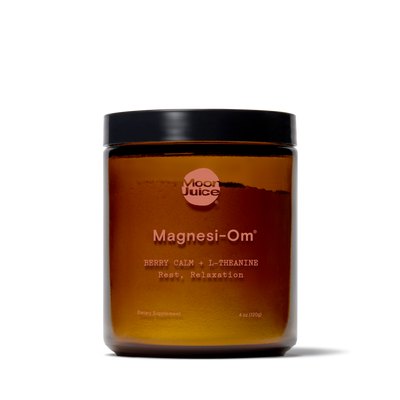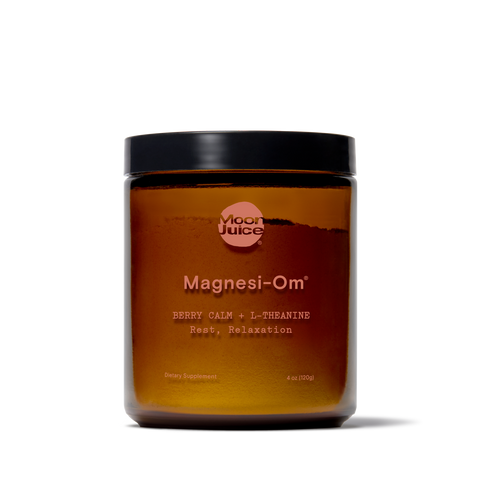Stress may not always feel natural, but it’s actually a normal part of how your body responds to the world. You’ve probably heard the evolutionary reason we’ve developed stress over time - if a lion or tiger is approaching us, stress allows us to react more quickly and protect ourselves from being eaten. Although most of us are not being approached by lions or tigers these days, our bodies don’t know the difference between that stress and the stress we feel from being behind on a deadline or sitting in traffic running late to an appointment.
While acute stress is perfectly normal - and unavoidable - if you experience high levels of stress over a long period of time, you may start to notice a negative impact on your health, both physical and mental. Chronic stress can have a wide range of effects on your mind and body, from your mood and brain power to your gut health and immune system. While getting rid of all stressors in your life is impossible, there are ways to proactively manage and retroactively treat chronic stress in order to improve your overall health and wellbeing.
What Is Stress?
When something stressful happens to you, your body releases hormones that create the feeling of stress. This can include symptoms such as:
- An elevated pulse
- Feelings of anxiety or depression
- Muscle tension
- Shortness of breath
Frequent stress and its symptoms can create ripple effects for your physical and mental health, especially when you’re feeling stressed out more often than not.
One way to think about stress is to consider its external forces, internal effects, and how you react to both of these factors together.
- External forces: work, money, relationships, current events, social media, etc.
- Internal forces: Your body’s physical response to stress like a lack of energy, tense jaw and muscles, or getting sick more frequently.
- How you mentally process these external and internal factors through increased levels of worry or lack of focus.
Another frame of reference you can use to understand stress is the fight/flight/freeze response. When we encounter danger, our brain tells our body to release a flood of adrenaline and other chemicals we need to deal with the situation. When the tiger approaches, for example, your body is prepared to either run from it or fight for your life.
The addition of “freeze” to the “fight or flight” model largely represents the general lack of actual predators in our modern lives. Modern stressors lean more toward psychological and emotional threats that come from our environment and our life circumstances, so overtime the body has created a third option of freezing in response.
The Body’s Response to Stress
Measuring stress levels can be a challenge, as we all feel and experience stress differently. But thanks to science, we are now able to understand what is causing our stress symptoms to appear, as well as how they impact numerous parts of our health.
When you start to feel stressed, your body starts by activating a part of your brain called the hypothalamic-pituitary-adrenal axis (HPA). Your HPA is the main part of your body’s network of nerves and hormones that respond to threats—including those coming from both inside and outside of your body. When your system identifies a threat, it releases adrenaline, intended to act as fast fuel.
If you don’t turn this influx of adrenaline into a physical fight or flight response, the related hormonal and chemical changes in your body can cause:
- Hypertension
- Headaches
- Gastrointestinal distress
- Skin complaints
- Muscle tension and pain
When exposed to this kind of stress response consistently, it can lead to more lasting problems over time.
Impact of Stress on the Body
Besides adrenaline, chronic stress can cause your HPA to produce excess amounts of other stress hormones such as cortisol. Overproduction of these hormones can affect several mental and physical systems in your body and lead to long-term issues.
The impact of stress on the body includes:
Mood
How does stress impact your mental health? If you’re actually facing a threat, stress could temporarily help to boost your mental capacity, alter your mood, and ultimately improve your chances of survival. These may include momentary feelings of:
- Increased awareness
- Improved cognition
- Euphoria
- Enhanced resistance to feeling pain
However, because we usually don’t end up applying that extra adrenaline to fight off a real physical danger, this misdirected stress can contribute to:
- Anxiety
- Affective disorders
- Major depression
- Addiction
Brain
Some kinds of long-term stress can actually shrink your brain and change your brain structure. The areas that suffer the most are associated with the regulation of:
- Emotions
- Metabolism
- Memory
Here, the type of stress you experience matters. Chronic stress can cause both short- and long-term imbalances between the parts of your brain responsible for decision-making and problem-solving.
Everyday stress is different. In a 2012 Yale study, low-level everyday stress didn’t show a direct impact on the imbalances in these parts of your brain. But it did appear to leave individuals more vulnerable to these imbalances when they encountered trauma later in life.
Unlike training for a sport, where you might improve with practice, people who deal with stress regularly are actually less able to regulate their emotions. Stress can make it more challenging to process social interactions and control your reactions when you face an intense stressor. On the other hand, positive stress—the kind that boosts your reaction to a challenge—actually helps your brain create stronger networks and become more resilient.
Hormones
If you menstruate, stress can affect the natural balance of your hormones and reproductive systems. When under the effects of chronic stress, you may experience:
- Missed menstruation
- Irregular ovulation
- No ovulation
Why does this happen? This is your body’s way of telling you that, based on the supposed danger around you and your stress response, becoming pregnant may not be the best idea in this moment.
Skin
Hives are a very common side effect of stress. often referred to as stress rash. When you’re stressed, your skin may:
- Itch, burn, or sting
- Appear red or blotchy
- Become swollen or puffy
- Show up as tiny bumps or larger welts
- Increase in size with scratching
Hives are most common in women and those with pre-existing allergies. They often show up in middle age, but a stress rash can appear at any time and on anyone suffering from the excess histamine your body produces when stressed.
If you’ve ruled out allergic reactions and other causes, your rash may be strictly stress-related. Treating your rash or hives could require both a topical treatment and lifestyle changes to reduce the stress in your life.
Aside from hives, stress can also cause:
- Dry skin
- Redness
- Acne breakouts
Revamping your skin care routine may help to reduce the effects of stress on your skin. Adding in a Vitamin C powder for skin can help you revive your skin and achieve your skincare goals.
Gut
When your body draws on adrenaline and other energy sources to prepare for a fight or a flight, it may also slow or stop your digestive processes so that your body can prioritize more immediate needs. You may experience:
- Heartburn
- Indigestion or inflammation
- Constipation
- IBS
Different people experience different effects on digestion when under stress. While stress can cause constipation for some, it can cause diarrhea in others.
Immunity
Stress has long been observed to reduce your immune system’s ability to fend off illnesses. Let’s look at why.
A study published in 2011 in the Brain, Behavior, and Immunity journal found that stress can change the balance of “good” and “bad” bacteria in your gut, leading to a higher amount of harmful bacteria. The authors suggest that this change in your gut microbiome results in a lower immune response.
A reduced immune response makes you more susceptible to illness, which is why we become ill more easily when under intense periods of stress.
Sign Up, Nerd Out
Get wellness tips, education, and recipes
delivered straight to your inbox.
Get wellness tips, education,
and recipes delivered
straight to your inbox.
Natural Ingredients for Stress Relief
To alleviate stress and its effects, you can take steps to not only prevent and reduce stressors, but to help you develop resilience to it, and calm the effects it has on your body and mind. Stress prevention may require making more substantial lifestyle changes to help you avoid the stressors in your life - but there are natural ingredients that can help be an active part of prevention, resilience, and healing.
Reinforce your approach to stress management with:
Ashwagandha
Ashwagandha is a small shrub with yellow blooms, native to India and Southeast Asia and with a long history in Ayurvedic medicine. Ayurveda, a system of traditional medicine from India, uses a holistic healing approach that relies on lifestyle changes, exercise, nutrition, and herbal medicines.
Ashwagandha’s roots and leaves are distilled to extracts or powder and have been shown to help improve:
- Sleep
- Mood disorders
- Inflammation
- Immune system
- Virility and fertility
- Blood sugar levels
- Memory and cognitive function
The biggest potential benefits this plant offers are stress reduction and achieving a sense of calm. Ashwagandha is an adaptogen, a metabolic regulator that improves your ability to cope with stress without causing any negative effects. It has been used for centuries in Ayurveda for stress management.
A 2012 study published in the Indian Journal of Psychological Medicine studied the impact of Ashwagandha on 64 individuals with a history of chronic fatigue. The study resulted in:
- Significant reduction of stress levels among the participants
- Substantial reduction in the participants’ stress hormones
- No serious side effects
The authors concluded that Ashwagandha can safely and effectively improve resistance to stress. Ash
Amla
Amla, also known as the beauty berry, is traditionally used to protect your skin from oxidative stress. Multiple studies have found evidence that Amla extract can help reduce oxidative stress, as well as potentially help protect your skin from the sun’s UV rays.
Because stress has been linked to an increased occurrence of oxidative stress, taking Amla may help to reduce its impact on your skin and throughout your body.
Shatavari
A member of the asparagus family, Shatavari is an adaptogen that has long been taken to support hormonal balance. It’s traditionally used to:
- Relieve the symptoms of PMS
- Regulate menstruation
- Optimize fertility
Shatavari may be especially useful if you’re worried about the effect of stress on your hormones and reproductive system. A 2018 study suggests that Shatavari may be useful in overcoming some stress-related reproductive health disorders by reducing oxidative stress and increasing antioxidants in your body.
Rhodiola
Native to Siberia, Rhodiola has traditionally been used to alleviate stress, anxiety, mental and physical fatigue, and depression.
A 2012 clinical study published in the Phytotherapy Research journal followed 101 subjects with symptoms of stress. After taking Rhodiola extract, all of the study’s participants showed significant improvements in their stress symptoms. Many participants saw relief after four weeks, but some experienced reduced stress symptoms in just three days.
Find Simple Ways to Lower Your Stress
If stress is affecting your mind and body on an ongoing basis, there are steps you can take to reduce its impact in several ways. For example, mindfulness, gentle movement, and meditation are three practices that can teach your body to overcome the automatic stress responses. Regular sleep and balanced nutrition also play a large role in your body’s ability to handle stressful situations.
Finally, supporting your body in developing resilience and overcoming the effects of stress on your body by supplementing with adaptogens and other natural ingredients is a great step to take to alleviate stress. Supplementing with SuperYou® is an easy way to make stress management part of your daily ritual. SuperYou® is a clinical strength formula made with organic, sustainably sourced, and wildcrafted adaptogens that help regulate cortisol and alleviate the emotional, mental, hormonal, and physical manifestations of stress.
Interested in supporting your mood and overall wellness? Browse our collection of mood boosting supplements today.
Sources
The American Institute of Stress. What is Stress?
American Psychological Association. Stress in America.
MedlinePlus. Stress and your health.
National Center for Biotechnology Information. The role of the hypothalamic-pituitary-adrenal axis in neuroendocrine responses to stress (Dialogues in clinical neuroscience).
Nature. Stress and glucocorticoids promote oligodendrogenesis in the adult hippocampus.
The Lancet. White Matter Abnormalities in Post-traumatic Stress Disorder Following a Specific Traumatic Event.
Biological Psychiatry. Cumulative Adversity and Smaller Gray Matter Volume in Medial Prefrontal, Anterior Cingulate, and Insula Regions.
Elsevier Science Direct. Good stress, bad stress and oxidative stress: Insights from anticipatory cortisol reactivity.
Cleveland Clinic. Can Stress Cause You to Skip a Period?
National Center for Biotechnology Information. Stress, pseudoallergens, autoimmunity, infection and inflammation in chronic spontaneous urticaria.














